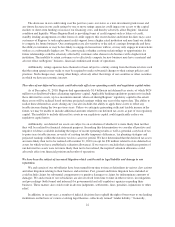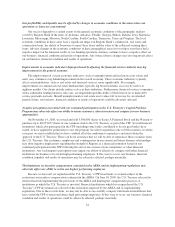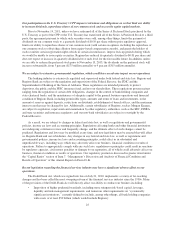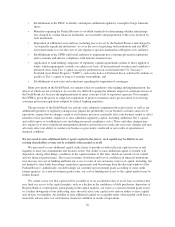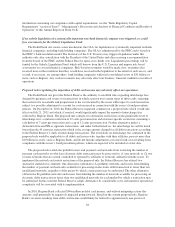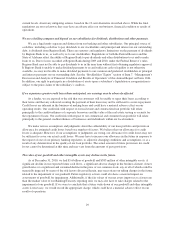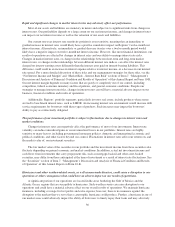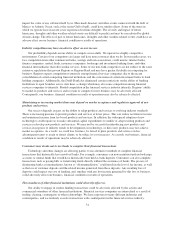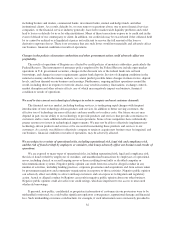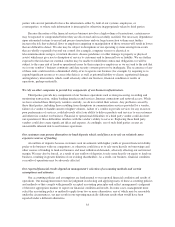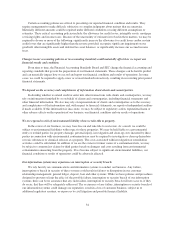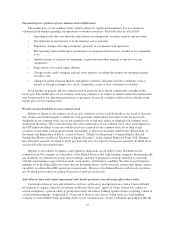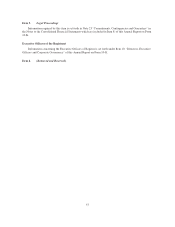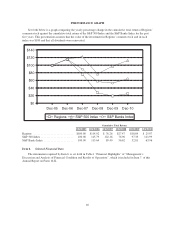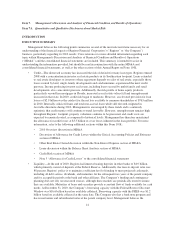Regions Bank 2010 Annual Report Download - page 46
Download and view the complete annual report
Please find page 46 of the 2010 Regions Bank annual report below. You can navigate through the pages in the report by either clicking on the pages listed below, or by using the keyword search tool below to find specific information within the annual report.including brokers and dealers, commercial banks, investment banks, mutual and hedge funds, and other
institutional clients. As a result, defaults by, or even rumors or questions about, one or more financial services
companies, or the financial services industry generally, have led to market-wide liquidity problems and could
lead to losses or defaults by us or by other institutions. Many of these transactions expose us to credit risk in the
event of default of our counterparty or client. In addition, our credit risk may be exacerbated if the collateral held
by us cannot be realized or is liquidated at prices not sufficient to recover the full amount of the loan or
derivative exposure due us. There is no assurance that any such losses would not materially and adversely affect
our business, financial condition or results of operations.
Changes in the policies of monetary authorities and other government action could adversely affect our
profitability.
The results of operations of Regions are affected by credit policies of monetary authorities, particularly the
Federal Reserve. The instruments of monetary policy employed by the Federal Reserve include open-market
operations in U.S. government securities, changes in the discount rate or the federal funds rate on bank
borrowings, and changes in reserve requirements against bank deposits. In view of changing conditions in the
national economy and in the money markets, we cannot predict possible future changes in interest rates, deposit
levels, and loan demand on our business and earnings. Furthermore, ongoing military operations around the
world, including those in response to terrorist attacks, may result in currency fluctuations, exchange controls,
market disruption and other adverse effects, any of which may negatively impact our business, financial
condition or results of operations.
We need to stay current on technological changes in order to compete and meet customer demands.
The financial services market, including banking services, is undergoing rapid changes with frequent
introductions of new technology-driven products and services. In addition to better serving customers, the
effective use of technology increases efficiency and may enable us to reduce costs. Our future success may
depend, in part, on our ability to use technology to provide products and services that provide convenience to
customers and to create additional efficiencies in our operations. Some of our competitors have substantially
greater resources to invest in technological improvements. We may not be able to effectively implement new
technology-driven products and services or be successful in marketing these products and services to our
customers. As a result, our ability to effectively compete to retain or acquire new business may be impaired, and
our business, financial condition or results of operations, may be adversely affected.
We are subject to a variety of operational risks, including reputational risk, legal risk and compliance risk,
and the risk of fraud or theft by employees or outsiders, which may adversely affect our business and results of
operations.
We are exposed to many types of operational risks, including reputational risk, legal and compliance risk,
the risk of fraud or theft by employees or outsiders, and unauthorized transactions by employees or operational
errors, including clerical or record-keeping errors or those resulting from faulty or disabled computer or
telecommunications systems. Negative public opinion can result from our actual or alleged conduct in any
number of activities, including lending practices, corporate governance and acquisitions and from actions taken
by government regulators and community organizations in response to those activities. Negative public opinion
can adversely affect our ability to attract and keep customers and can expose us to litigation and regulatory
action. Actual or alleged conduct by Regions can result in negative public opinion about our other business.
Negative public opinion could also affect our credit ratings, which are important to our access to unsecured
wholesale borrowings.
If personal, non-public, confidential or proprietary information of customers in our possession were to be
mishandled or misused, we could suffer significant regulatory consequences, reputational damage and financial
loss. Such mishandling or misuse could include, for example, if such information were erroneously provided to
32


